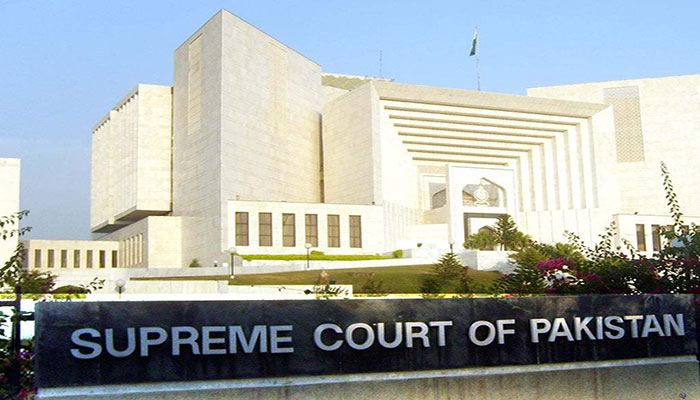Law enacted to restore sacked employees: SC
ISLAMABAD: The Supreme Court on Tuesday observed that sacked employees were appointed on contract. However, a specific law was enacted for their restoration.
A three-member bench of the apex court, headed by Justice Umar Ata Bandial, heard the review petitions filed by the government and the sacked employees against the court judgment striking down the Sacked Employees (Reinstatement) Act 2010.
Justice Umer Ata Bandial observed that they could not examine the instant review petitions as to whether the decision of the caretaker government of sacking the employees was right or wrong, but they are looking into matter of the Sacked Employees (Reinstatement) Act 2010. Justice Mansoor Ali Shah, another member of the bench, observed that the court in one of its decisions had held that the process of sacking the employees was correct.
The judge questioned as to why the act was passed for restoring the employees who were sacked during 1993 and 1996. Before this period and thereafter, several employees were sacked by different departments, then why a law was made for a specific period and for specific people.
“From 1993 to 1996, neither there was any civil war nor an epidemic surfaced,” the judge remarked and questioned as to whether restoring few employees after 11 years is not an exploitation of other employees.
Arguing before the court, Barrister Aitzaz Ahsen, counsel for Intelligence Bureau employees, submitted that his clients were sacked by the caretaker government in 1996. He contended that the apex court in its two judgments had settled the principle that the caretaker government is not empowered either to make appointments or sack the employees.
Justice Mansoor Ali Shah asked why the act was made for restoring the employees.
Aitzaz Ahsen said if his clients were employed illegally, receiving benefits is wrong. He submitted that nobody in the IB had challenged the appointment of his clients. He said there was no need for an act or an ordinance in the case of his clients, adding that they continued their jobs in the IB after the promulgation of the ordinance. Justice Mansoor Ali Shah asked Aitzaz whether the Supreme Court could set aside an act passed by the parliament. Aitzaz replied in affirmative but added that efforts should be made for protecting the act. “If an act of the parliament is repugnant to fundamental rights, it can be set aside,” Aitzaz said. He submitted the apex court did not order sacking the persons employed in the Islamabad High Court but gave them protection and ordered that the IHC employees should be included in the surplus pool. He said the Supreme Court had protected the incentives in the judges pension case as well. He said the apex court gave the verdict without issuing notices to the sacked employees as well as the attorney general. “Without hearing the sacked employees, the judgment could not be given against them,” he submitted.
Sardar Latif Khosa, counsel for 62 employees of SNGPL and 116 employees of State Life Insurance, told the court that their clients were employed between 1993 and 1996 and the caretaker government through an executive order sacked all of them in 1997. He said some of the employees had approached the apex court and were restored. Justice Umer Ata Bandial told the counsel that the case he was referring was related to 2003 and asked how the said judgment could be relevant in the judgment under review. Later, the court adjourned the hearing for today (Wednesday).
-
 Climate Nearing Dangerous Tipping Points, Study Shows
Climate Nearing Dangerous Tipping Points, Study Shows -
 James Van Der Beek, 'Dawson's Creek' Star, Dies At 48
James Van Der Beek, 'Dawson's Creek' Star, Dies At 48 -
 Threads Launches Dear Algo AI Feature To Personalise Feeds In Real Time
Threads Launches Dear Algo AI Feature To Personalise Feeds In Real Time -
 Police Take Action Over Andrew's Ties With Jeffrey Epstein While In UK Office
Police Take Action Over Andrew's Ties With Jeffrey Epstein While In UK Office -
 Courtney Love Makes First Appearance Since New Report On Kurt Cobain's Death
Courtney Love Makes First Appearance Since New Report On Kurt Cobain's Death -
 King Charles Anxious As Uncertainty Grows Over Sarah Ferguson’s Next Move
King Charles Anxious As Uncertainty Grows Over Sarah Ferguson’s Next Move -
 Real Reason Kim Kardashian Is Dating Lewis Hamilton
Real Reason Kim Kardashian Is Dating Lewis Hamilton -
 Rihanna Leaves Elderly Woman Star-struck In Viral Grocery Store Video
Rihanna Leaves Elderly Woman Star-struck In Viral Grocery Store Video -
 TikTok US Launches Local Feed Using Precise Location Data
TikTok US Launches Local Feed Using Precise Location Data -
 Jill Biden’s Former Husband Charged With Wife’s Murder
Jill Biden’s Former Husband Charged With Wife’s Murder -
 Zayn Malik Reveals Parenting Decision Gigi Hadid Criticized Him Over
Zayn Malik Reveals Parenting Decision Gigi Hadid Criticized Him Over -
 Palace Releases Prince William's Photos From Final Day Of His Saudi Arabia Visit
Palace Releases Prince William's Photos From Final Day Of His Saudi Arabia Visit -
 Microsoft Warns Of AI Double Agents As Enterprise Adoption Of AI Agents Surges
Microsoft Warns Of AI Double Agents As Enterprise Adoption Of AI Agents Surges -
 Kate Middleton, Prince William Break Silence Over Tragic Shooting In Canada
Kate Middleton, Prince William Break Silence Over Tragic Shooting In Canada -
 'Finding Her Edge' Star Madelyn Keys Explains Adriana's Remarks About Brayden Romance
'Finding Her Edge' Star Madelyn Keys Explains Adriana's Remarks About Brayden Romance -
 Royal Expert Raises Questions Over Sarah Ferguson's 'plotting' Stunning Comeback
Royal Expert Raises Questions Over Sarah Ferguson's 'plotting' Stunning Comeback




